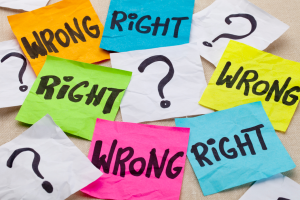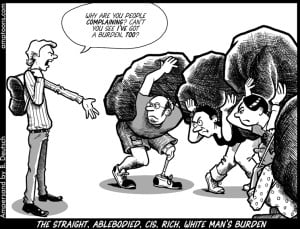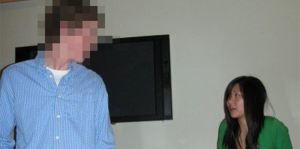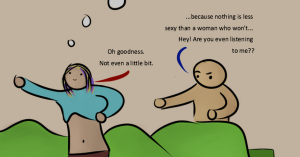One night in January, I checked myself into the hospital, got hooked up to dozens of wires and sensors, and spent the night and most of the next day there.
A few days later, my doctor called to give me the news: I have narcolepsy, a neurological disorder that causes the brain to destroy its own cells. The particular cells it destroys produce a chemical that helps you sleep properly and stay awake afterwards.
Narcolepsy is incurable, but it’s treatable. And most importantly, I finally had an answer for why I’ve been unbearably tired for most of every single day for years.
Getting to that diagnosis has been a long and exhausting journey.
Unfortunately, most of that journey was not spent working with doctors who could help me. Most of it was spent trying in vain to explain to the people in my life how I was feeling, and being told that I don’t really feel that way or that it’s not as bad as I say it is.
Long before I knew that I had a chronic illness or what that illness is, I knew that something wasn’t right about the way I felt.
I was reasonably healthy and active, and I tried to sleep at least seven hours each night. But I felt like I hadn’t slept at all. I felt like I could sleep forever and still feel tired.
Over the past few years, I’ve started to find friends and partners who believe me when I say how I feel, and that’s what probably helped push me to seek treatment. But for most of those years, the people in my life minimized, invalidated, or simply denied my experience.
These are some of the things they said, and why they were so harmful.
1. ‘You’re Too Young to Feel That Tired’
One time, an older person actually said this to me.
Suddenly, I realized that they were right – I am too young. And just like that, my neurochemistry changed, and my sleep cycles became normal, and years of crushing tiredness and despair simply disappeared.
Just kidding. That didn’t happen. Because that’s not how chronic illness works.
Of course, aging can increase certain health risks, and I believe older folks when they say that they are more tired than they were when they were younger. (Disclaimer: I am not a doctor.) However, none of that means that younger people can’t develop chronic illnesses that involve sleepiness and fatigue.
In fact, the typical age of onset for narcolepsy is adolescence or young adulthood. Some even develop it as children.
Although I’m sure no one who said it meant it this way, the effect of constantly hearing that I can’t possibly feel the way I say I feel is that I was gaslit.
I started to doubt my own perception of my body and how it feels.
I still doubt it. Even now, with a diagnosis from the head of the sleep department at a well known university hospital, I wonder almost daily if maybe I don’t really feel the way I think I do.
This comment – and its frequent accompaniment, “Just wait till you’re older!” – is also a jarring and terrifying reminder that my illness is incurable and that aging could very well make my symptoms even worse.
I get that it can be difficult to acknowledge that chronic illness can strike people at any age, but gaslighting me is not an acceptable way to deal with that discomfort.
2. ‘Just Ignore It and Focus on Something Positive’
Just about anyone with a chronic or mental illness has probably heard this one.
One of the reasons it’s so ableist is because it assumes that people can change how they feel simply by wishing it so – and that if they can’t change how they feel, it’s their fault for not trying hard enough.
Ironically, though, this was actually my main coping strategy for narcolepsy for many years. Staying active and busy was the only way to keep my mind off of how terrible my body felt. Without a diagnosis or medication, that’s what I had to do.
But it’s not possible or sustainable to fill every waking minute of your life with some sort of activity.
It also robbed me of most of the beautiful, relaxed moments that people cherish most. I couldn’t put aside my phone or book and just cuddle with a partner in comfortable silence because I’d almost immediately be filled with an unbearable and unquenchable need to sleep.
I couldn’t read under the covers. I couldn’t curl up on the couch with a mug of tea and let my mind wander. I could barely watch TV, play board games, or drive a car for longer than twenty minutes.
“Just ignoring it” allowed me to get through the day.
It didn’t allow me to build a life that felt livable. The only thing that can do that is treatment and symptom management.
If even a few of the people who told me to “just ignore it” had instead said “That sounds really rough. Have you thought about trying to get some help for it?” I might have done that sooner and saved myself a lot of despair.
3. ‘But You Don’t Look Tired’
Comments like this are so common that one of the most well known websites for folks living with chronic illness or disability is called “But You Don’t Look Sick.”
We hear this all the time.
It’s based on the ableist assumption that sickness or tiredness “looks” a certain way and that it should be easy to spot who’s “really” sick and who’s not.
That makes it really difficult for folks who don’t “look” sick to access the resources or support they need.
After all, they must just be faking it for the attention, or confused about their own bodies.
For me, hearing this always stings.
The reason I don’t necessarily “look” tired is because, as I mentioned earlier, I work really, really hard to keep myself up and active in order to cope.
Of course I don’t look tired while I’m hiking five miles in subzero temperatures, dancing the night away at a party, or cooking dinner for ten. When I’m so tired I can’t lift a glass of water up to my mouth, you won’t see me out and interacting with people.
And like many people with chronic illnesses, I’ve learned how to fake health to keep people comfortable.
I remind myself to smile, to keep my eyes all the way open. I sit down on a bar stool while everyone else is standing so that I don’t sway on my feet. I fidget or play with my phone to stay alert when things are dull. I wear makeup. I’ve learned how to yawn with my mouth closed.
Plenty of people with chronic pain manage to hide the fact that they are constantly in pain. Tiredness isn’t that different.
4. ‘Just Try [Unsolicited Advice]’
Exercise, dietary changes, weight loss, more sleep, yoga, acupuncture, marijuana, getting a boyfriend, finding God, abandoning pharmacology – folks with chronic fatigue hear all kinds of suggestions.
While some of these may have helped some people with their particular issues, giving them us unsolicited advice implies that you know more about our bodies than we do.
It’s also often rather patronizing you have no idea how much we’ve already tried.
When I saw a doctor about my fatigue for the first time, I brought a four-page printed document detailing all of my failed attempts to solve the problem. It was pretty much everything you can imagine that isn’t inaccessible, dangerous, illegal, or contrary to my beliefs.
Just like people without depression often conflate it with ordinary sadness, people without chronic illness often conflate the sort of tiredness we feel with the way they feel after a long, stressful day or a night with insufficient sleep.
My tiredness isn’t that kind of tiredness. It’s a tiredness that comes from years of sleep deprivation. It sinks into your bones, clouds your mind, and breaks your spirit.
More sleep doesn’t help. As my sleep study showed, I can sleep a full eight hours at night and still be able to fall asleep within a few minutes at any point during the day after.
All I have to do is lie down and close my eyes, and I can sleep for ten, twelve, or more hours. I can take multiple naps per day, and I’ll never feel any better – without treatment.
When people without chronic illness give unsolicited advice to those who have it, it puts us in the awkward position of either pretending to accept the advice or politely explaining that it’s not helpful or doable.
But that often leads the person to argue with us about our own bodies and pressure us to try the advice. Either way, it’s a lot of emotional labor.
And we’re already tired.
5. ‘Well, At Least You Don’t Have [Other Illness]’
At least I don’t have cancer. At least I don’t have diabetes. At least I don’t have a real illness, they seem to be implying.
When it comes to serious illness – chronic or otherwise – you really can’t compare.
Different people may experience the same illness differently, and people vary in terms of the privilege, social support, and other resources they have when it comes to treating or coping with illness.
Some illnesses restrict you severely, but they’re curable.
Others will last for the rest of your life. Some, like mine, are invisible, making them extremely difficult to diagnose, understand, and explain to others. Some can be completely managed with medication or lifestyle changes and others, only partially.
I don’t know what it’s like to have cancer or diabetes, but I do know what it’s like to have narcolepsy, and you don’t want it.
Although the few media portrayals of narcolepsy that exist mainly play it off for laughs – haha, look, they fell asleep right in the middle of a conversation! – the reality is that it’s not funny and it’s not just about sleepiness.
It’s painful.
Sleep deprivation makes your eyes burn and your muscles ache. My arms and legs often felt like lead. Physical sensations were often overpowering. Even with sunglasses on, sunlight hurt. Music, even slightly too loud, hurt.
A partner’s gentle touch sometimes made my skin burn for no apparent reason. It felt like my eyelids had weights tied to them, and every moment I spent with my eyes open felt like weightlifting.
So, no, I don’t know which chronic illness is objectively the worst, but I do know this one sucks a lot, and it’s every bit as real as the ones you can see on a PET scan or blood test.
***
If well intentioned comments like these are harmful, what should you say instead?
I could write an entire article on supporting someone with chronic fatigue. There isn’t necessarily any “right” thing to say.
Many people living with a disability or chronic illness of any kind appreciate it when someone listens to them without offering advice or trying to fix anything. Many of us would appreciate it if folks would ask how they can make our lives easier.
For instance, for me, driving is difficult because it makes me extra tired and that’s really uncomfortable and potentially unsafe. If friends would offer to give me rides to social events, or to meet up with me within walking distance of my house, that would be really helpful.
But people with chronic illnesses aren’t always comfortable asking for such accommodations unless our friends offer first.
Remember, many people don’t even believe us when we say we’re sick.
For me, it would’ve also made a huge difference if someone close to me had gently encouraged me – at some earlier point – to try to seek medical treatment.
Of course, this can be risky ground to cover with a chronically ill friend. You don’t necessarily know what we’ve already tried, what we’re able to access and afford, or what our experiences with medical care have been like in the past.
But I had people who knew me well enough to know that I had the privilege of being insured, that I had never really tried to seek diagnosis or treatment, and that despite some phobias of needles, I didn’t have any significant barriers to getting medical care.
If someone, at some point, had said “Wow, that sounds really hard and stressful. Do you think there’s anything that could help?” it might’ve changed my life.
And while I’m not blaming anyone for how long it took to discover what was going on with me, validation and inquiry matter.
My experiences are not everyone’s experiences, but what almost all of us have in common is that we need to be heard and validated.
All of my examples above are variations on a theme, and that theme is dismissing the chronically ill person’s feelings and perceptions.
The reality of chronic illness is profoundly challenging and disturbing to face – not just for us as we struggle to accept our diagnoses (or lack thereof), but for our friends, family, partners, coworkers, and others who watch us suffer.
I understand why many people would rather try to avoid that reality rather than confront it.
But that avoidance helps prop up systems of ableism that devalue and dismiss people whose bodies do not work the way we assume they’re supposed to.
We need you to confront this reality and sit in that pain and discomfort with us.
[do_widget id=’text-101′]
Miri Mogilevsky is a Contributing Writer for Everyday Feminism. She is a recent graduate of a Masters in Social Work and is starting a career as a counselor in Columbus, Ohio. She loves reading, writing, and learning about psychology, social justice, and sexuality, and is working on her cat photography skills. Miri writes a blog called Brute Reason, rants on Tumblr, and occasionally even tweets @sondosia. Check out her articles here.
Search our 3000+ articles!
Read our articles about:
Our online racial justice training
Used by hundreds of universities, non-profits, and businesses.
Click to learn more





















